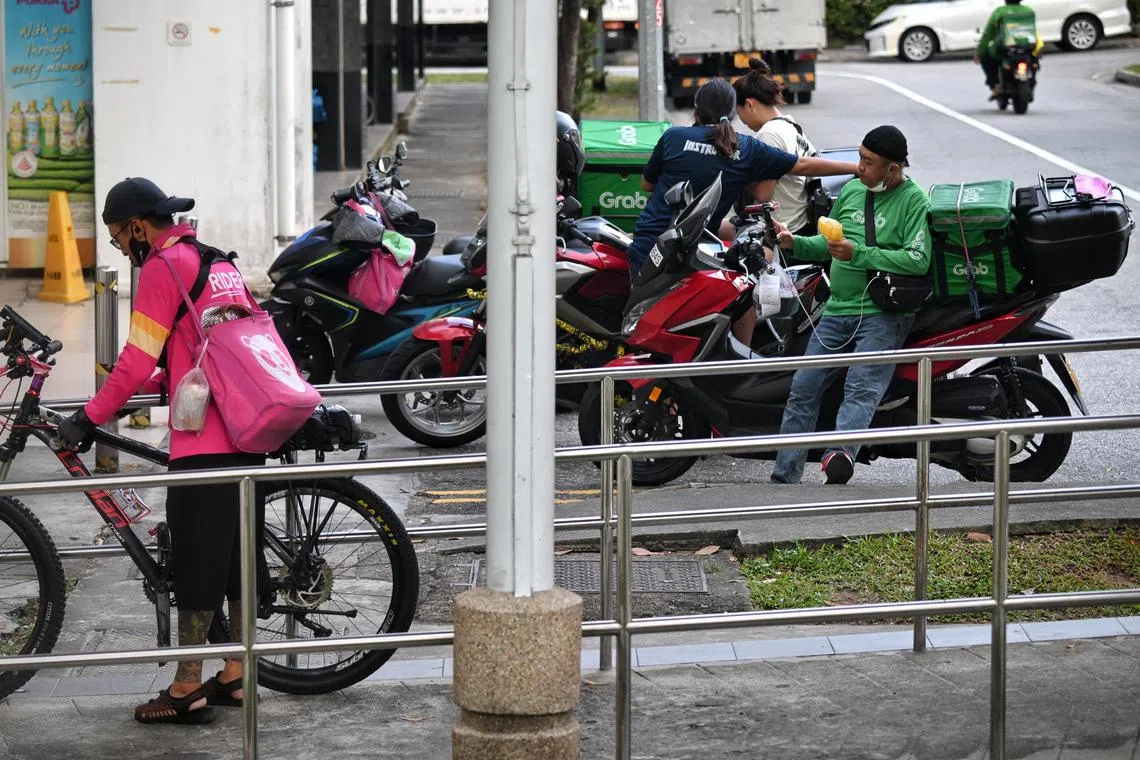NTUC lobbies for better rights for gig workers, older workers
Sign up now: Get ST's newsletters delivered to your inbox

The rise of the gig economy has led to more workers, such as platform delivery workers, joining the industry.
ST FILE PHOTO
SINGAPORE – Gig workers and older workers face challenges such as inadequate protection and insufficient opportunities to upskill.
These are some new challenges that unions face and have to tackle, said National Trades Union Congress (NTUC) assistant secretary-general Desmond Choo, noting that more protection for those vulnerable groups is needed.
Mr Choo, who is also North East District Mayor, was speaking virtually at Singapore Perspectives 2023, a conference organised by the Institute of Policy Studies on the theme of work.
The rise of the gig economy has led to more workers, such as platform delivery workers, joining the industry. But many of them work without adequate protection or benefits, said Mr Choo.
“Workers’ priorities are shifting, more workers value flexibility and freedom and therefore we have more self-employed workers, especially gig workers,” he said.
But the Covid-19 pandemic sparked unprecedented global economic disruptions and pushed Singapore into an economic downturn, putting jobs at risk and causing many businesses to shut down, showing a need to protect vulnerable workers, said Mr Choo.
“This means levelling the playing field for such workers, looking into issues like unemployment support and finding ways for them to upskill to get better jobs.”
There is also a risk of a two-track economy forming, with one group continuing to enjoy wage and career growth while the other group of workers who may be older and less educated gets fewer such opportunities, said Mr Choo. This increases social inequality, which can lead to workers feeling disadvantaged and anxious.
Low-wage workers may face problems such as having less education, family issues and a lack of mental, physical and emotional space, which might make committing to training more of a challenge, said Ms Ranganayaki Thangavelu, deputy executive director of Beyond Social Services. The charity is dedicated to helping children and youth from less privileged backgrounds break away from the poverty cycle.
Speaking at a panel on job vulnerabilities at the conference, Ms Ranganayaki said low-wage workers may also have to juggle multiple jobs to make ends meet.
NTUC assistant secretary-general Patrick Tay said another concern for the workforce is older professionals, managers and executives (PMEs) facing difficulty finding jobs and attributing it to their age, especially those in their 40s to 60s. Some of the challenges they face include job displacement and challenges in re-entering the workforce after being laid off.
The PME task force – formed by NTUC and the Singapore National Employers Federation in October 2020 – engaged more than 10,000 PMEs, employers and stakeholders to propose nine recommendations
Some recommendations that the task force submitted to the Government in 2021 included enhancing fair employment practices by strengthening enforcement against errant companies adopting unfair practices, strengthening unemployment income support for PMEs who are involuntarily jobless, and providing PMEs with customised career coaching.
“Singapore is experiencing significant demographic shifts with our ageing population... The anxieties, concerns and aspirations of our local PMEs must not be ignored,” said Mr Tay.
“NTUC is working closely with the Government and employers to ensure we have a level playing field for our local PMEs so that they feel supported and valued, making them more likely to be motivated and productive, which is a win-win outcome for both businesses and our workforce,” he added.


